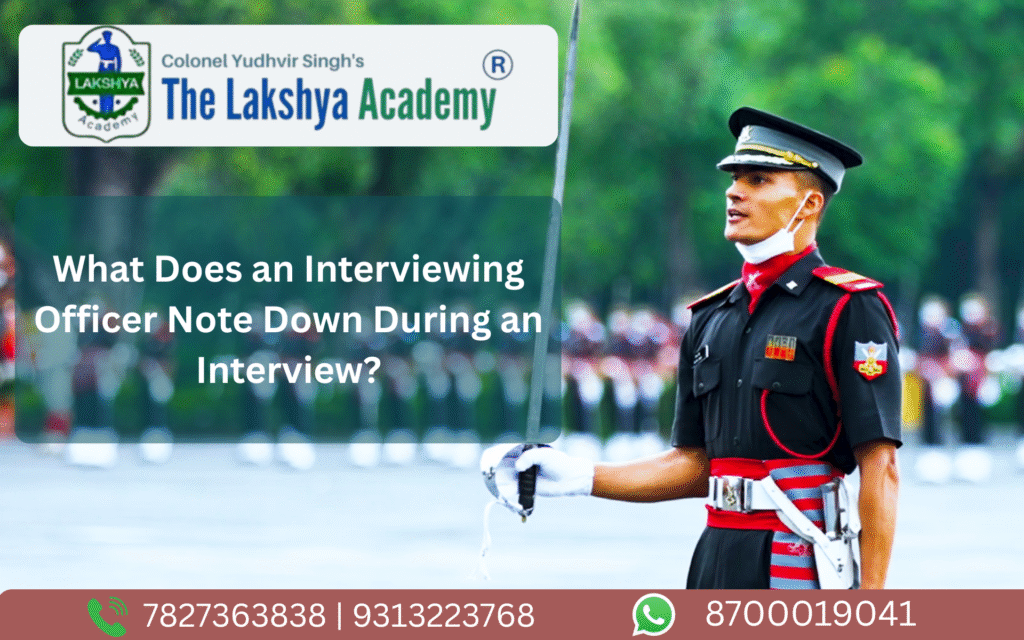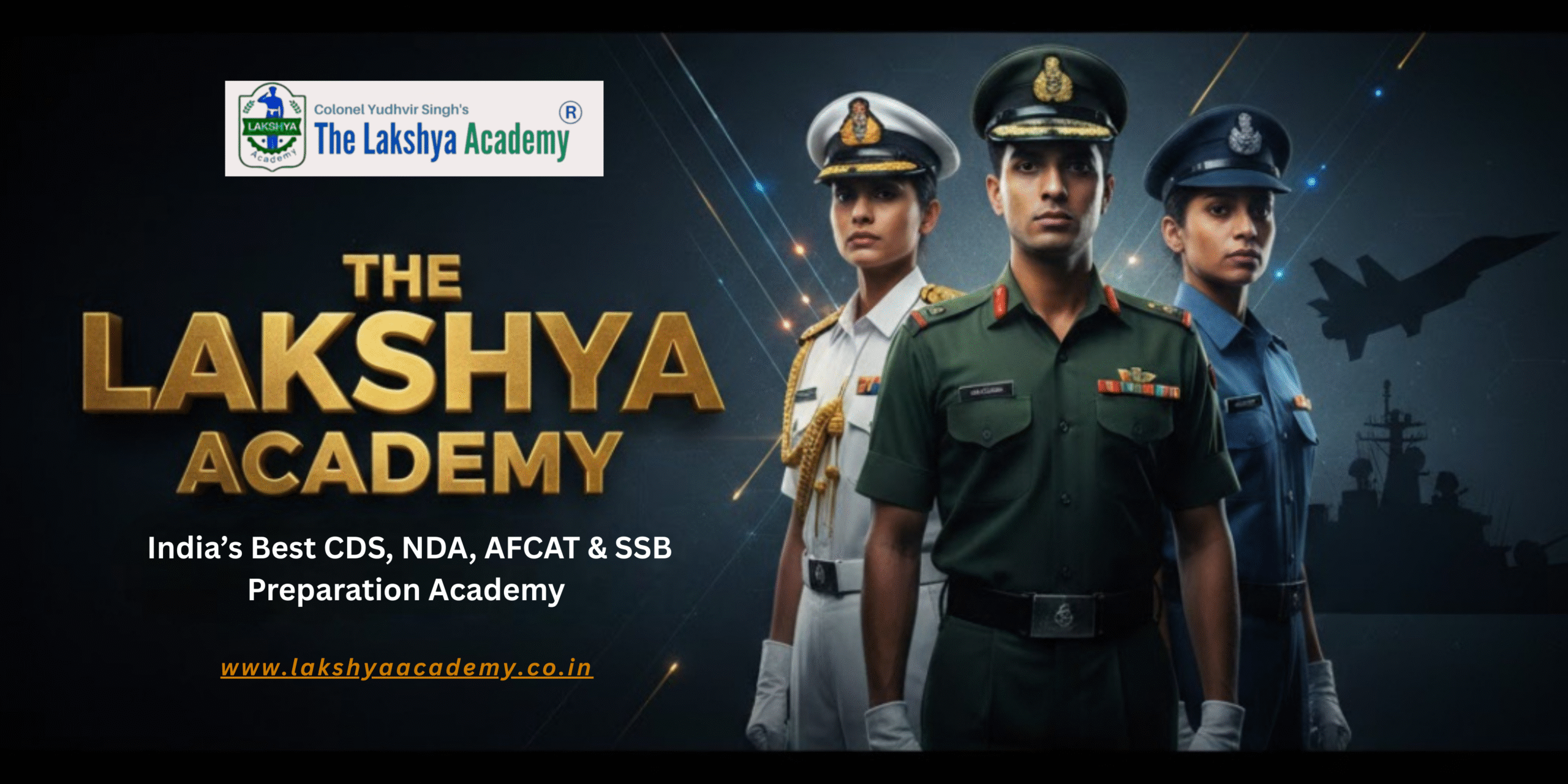What Does an Interviewing Officer Note Down During an Interview?
- The Service Selection Board (SSB) interview is one of the most comprehensive and insightful personality assessments conducted for candidates aspiring to join the Indian Armed Forces. Unlike typical job interviews that focus primarily on academic performance or professional skills, the SSB interview delves deep into the candidate’s character, potential, leadership qualities, and officer-like attributes (OLQs).
- But have you ever wondered what exactly the Interviewing Officer (IO) notes down during this crucial interaction? What goes on in that notepad that seems to hold your future? Let’s uncover the detailed aspects of what the IO observes, records, and analyses during the personal interview.

- Understanding the Role of the Interviewing Officer
Before diving into the specifics, it’s important to understand the purpose behind the IO’s observations. The Interviewing Officer’s role is to assess your suitability to become an officer in the Indian Armed Forces. The IO uses psychological insight, structured questioning, and personal interaction to evaluate your personality traits, values, and behavioral tendencies.
The notes taken during the interview are not random scribbles – they are structured assessments based on the fifteen Officer-Like Qualities (OLQs) divided into four key factors:
- Planning and Organizing
- Social Adjustment
- Social Effectiveness
- Dynamic Personality
These notes form an essential part of the final evaluation and are later correlated with your results in the Psychological Tests and Group Testing Officer (GTO) tasks.
- The First Impressions Matter: Initial Observations
As soon as you enter the room, the Interviewing Officer begins to assess you. Your body language, appearance, confidence, and greeting style are silently noted. This is not about how expensive your clothes are but rather about how you carry yourself with discipline, respect, and composure.
- Some of the initial aspects the IO notes include:
- Dress and grooming: Clean, tidy, and disciplined appearance.
- Posture and body language: Straight posture, firm handshake, confident smile.
- Confidence and communication style: Whether your tone is respectful yet assertive.
- Eye contact and attentiveness: Indicating sincerity and confidence.
- Response to greetings and instructions: Reflecting your social manners and awareness.
- These initial cues help the IO gauge your self-awareness and emotional balance, which are crucial for leadership.
- Family Background and Personal Life
The first part of the interview usually revolves around your personal background. This section is designed to understand your environment, upbringing, and influences. The IO takes careful notes about:
- Family structure and relationships
- Occupation of parents or guardians
- Values and principles learned at home
- How responsibilities are managed
- Your role within the family dynamics
These details allow the IO to assess emotional maturity, responsibility, and adaptability. For example, if a candidate comes from a modest background but displays ambition and discipline, it shows resilience and self-motivation – strong OLQs that are valued in officers.
Next, the IO explores your educational journey – not merely your marks, but your attitude toward learning. Officers must have the ability to grasp new ideas quickly and think logically under pressure.
- The IO notes:
- Consistency in academic performance
- Subjects you liked or disliked (and why)
- Participation in extracurricular activities
- Leadership roles in school or college
- Handling of failures or setbacks
Here, the officer isn’t judging your rank in class but looking for signs of initiative, curiosity, and determination. If you have overcome academic challenges or taken up leadership roles in your institution, it reflects a positive and growth-oriented mindset.
- Interests, Hobbies, and Extracurricular Activities
Your hobbies say a lot about who you are outside your academic or professional life. The IO notes down your genuine interests and cross-verifies them during follow-up questions.
- Some key aspects recorded are:
- Depth of knowledge in your hobbies
- Regularity and sincerity in pursuing them
- What you have learned from these activities
- Team involvement or leadership experiences
For example, a candidate who plays football regularly demonstrates team spirit, physical fitness, and cooperation – all essential for military life. Similarly, a hobby like reading may reflect intellectual curiosity and patience.
- Social Relationships and Friend Circle
The IO often asks about your friends, their nature, and what you like or dislike about them. This section helps understand your social adaptability and interpersonal skills.
- The officer notes:
- Your social circle’s diversity and influence
- Your attitude toward teamwork and cooperation
- Ability to maintain healthy relationships
- Judgment of others’ character and empathy
Candidates who respect others’ viewpoints, maintain loyalty, and show empathy are considered socially mature and emotionally balanced, key qualities of a leader.
- Responsibilities and Achievements
A significant part of the interview focuses on the responsibilities you have handled – whether at home, in school, college, or workplace. The IO wants to see how you respond to accountability and whether you show initiative and reliability.
- The officer notes down:
- Specific tasks or duties handled
- Approach toward problem-solving
- Consistency in completing assigned roles
- Team management and leadership involvement
Achievements – big or small – are also recorded. The IO is not looking for trophies alone but for effort, perseverance, and contribution. A candidate who took charge of organizing a small event may display more leadership potential than one who won a single competition without teamwork.
- Self-Awareness and Self-Improvement
- -awareness is the foundation of personal growth. The IO carefully evaluates how well you know yourself – your strengths, weaknesses, and future goals.
- Common notes in this section include:
- Honesty about weaknesses and efforts to improve
- Clarity of thought and self-reflection
- Balanced self-assessment (neither overconfident nor underconfident)
- Ambition aligned with realistic effort
For instance, if you admit that you are working to improve your public speaking skills through regular practice, it reflects maturity and self-discipline.
- Current Affairs and General Awareness
The IO may ask questions related to current national and international issues, defense knowledge, or general awareness. Your responses show your alertness, interest in the world, and analytical thinking.
- The officer notes:
- Depth of knowledge, not just surface awareness
- Ability to express opinions logically
- Balanced perspective and patriotism
- Interest in defense forces and understanding of service life
Being updated about national issues and military affairs reflects your commitment and sense of responsibility as a potential officer.
- Defense Knowledge and Motivation
Perhaps the most crucial part of the interview revolves around your motivation to join the Armed Forces. The IO keenly notes the authenticity, clarity, and passion in your answers.
- He may record:
- Why you want to join the Armed Forces
- What inspires you about the uniform
- Awareness of challenges and responsibilities
- Understanding of Army/Navy/Air Force life
- Preparation efforts made so far
Candidates who display genuine motivation rather than superficial interest are rated higher. Your motivation should come from a desire to serve the nation and lead with integrity, not merely job security or status.
- Reaction to Hypothetical and Stress Questions
The IO often introduces situational or stress questions to check your presence of mind, composure, and decision-making ability. Your responses are carefully noted to evaluate your mental agility and emotional balance.
- Examples include:
- “What will you do if you are not recommended?”
- “How would you handle a disagreement with your superior?”
- “Describe a time you faced failure.”
The officer records your reaction, thought process, and reasoning pattern. Calm, logical, and optimistic responses demonstrate officer-like composure and maturity.
- Final Observations and Correlation
At the end of the interview, the IO reviews his notes and correlates them with your Psychological Test scores and GTO performance. The final assessment is not based on one answer but on your overall consistency of character, attitude, and leadership potential.
- The IO’s notes typically summarize:
- Key strengths and weaknesses
- Overall impression of personality
- Compatibility with the defense lifestyle
- Recommendation status
These notes form a crucial part of your final SSB result and are used in the conference round where all assessors discuss each candidate holistically.
Final Thoughts
- An SSB interview is not a test of knowledge but of character and potential. The Interviewing Officer’s notepad is a mirror of your personality – capturing not what you claim to be, but what you truly are.
- So, instead of trying to guess the “perfect answers,” focus on being genuine, disciplined, and self-aware. The Armed Forces seek leaders who are authentic, responsible, and capable of inspiring others.
- Remember, the IO is not looking for flawless individuals, but for those who can learn, adapt, and lead with integrity. When you walk into that interview room, carry confidence, honesty, and a true sense of purpose – because those are the qualities that will always get note





